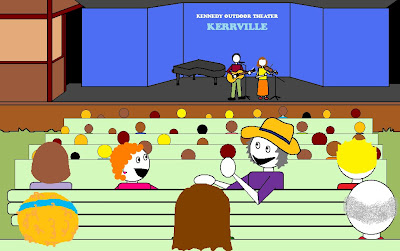With this many plays rehearsing and running at once, pretty much everyone who wanted to act got to be in a show. Male actors were in especially short supply, since a lot of high school boys feel that theater is incompatible with their developing machismo and three carefully cultivated beard hairs.

That is how Wesley* ended up in the tutu.
One of the student directors had picked a show called “15-Minute Hamlet,” which is exactly what it sounds like—Shakespeare’s tragic masterpiece, edited to 15 minutes by Tom Stoppard. Since its source material was written in an era when all women on stage were played by men anyway, this show had two female parts and about ten male ones. On account of the beard scarcity problem, however, our director decided to switch the roles. Voila! The play was a perfect fit for high school, requiring only two guys (Ophelia and Queen Gertrude) and a whole bunch of girls (Hamlet, King Claudius, Rosencrantz, Guildenstern, Fortinbras, etc.).
The director thought this gender arrangement might be confusing for the audience, though, so all the actors wore large, reflective versions of the “male” and “female” symbols around their necks on stage.
That is how I, Hamlet, ended up sitting in a park wrapping aluminum foil around a circle-and-arrow “male” icon two feet across.
After a couple weeks of rehearsals, the show was shaping up well. We definitely had the best props that would be appearing on stage that spring, including a fully operational SuperSoaker, a Styrofoam head, and a plastic sword that made battle noises. All the girls wore simple, all-black costumes to facilitate changing between characters, while Ophelia sported a floor-length purple gown and Gertrude complimented his goatee with a delicate pink leotard and tutu.
Finally our director, Brandon, brought the last portion of our costumes: brand-new sparkly boxer shorts. These were for the last two minutes of the play—a superfast remix of the whole story, presented with the actors’ pants around our ankles.
That is how my high school career ended up containing this moment:

Surprisingly, we did not suffer any wardrobe malfunctions during the performance—which is to say that all the clothes intended to come off came off, and mercifully the ones intended to stay on stayed on.
However, Brandon had purchased our decorative drawers with his own money, and he wanted them back after the show. We had all been strictly admonished to wear at least five pair of under-underwear with, preferably, a generous layer of Scotchgard, and to finish off a gallon of Tide on the garments before returning them.
Once the show finished, though, I didn’t really have a chance to see the director to give my costume back. We didn’t have any classes together, since I was a sophomore and he was a senior. We didn’t hang out, since I spent my discretionary time in the chemistry classroom playing with the model carbon atoms. We didn’t have any mutual friends, again because of the carbon atoms thing. My only choice was to return Brandon’s boxer shorts via the drama teacher.

An approximate script of this conversation:
Me: Hi Mrs. Schmidt. You know how I was in a show last week? With costumes? Well, Brandon was directing it, and he bought the costumes. And he wanted them back. So here’s my costume. It’s these boxers that were a costume for a play. Can you give these costume boxers back to Brandon? ‘Cause they’re his. No! Well, yes. But only because of the play, since they were a costume. In a play. Did I mention these boxers of Brandon’s that I have were a costume in a play, which is why I have his boxers, because of the play and the costume? Please?
Mrs. Schmidt: …
And that is how I ended up never looking my drama teacher in the eye again.
*Names have been changed in case anyone’s online banking security question was “What abbreviated play required you to take off your pants in high school?”

















